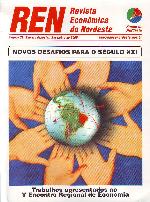DINÂMICA DE CRESCIMENTO REGIONAL – UMA ANÁLISE EMPÍRICA DA REGIÃO SUL
DOI:
https://doi.org/10.61673/ren.2000.1905Keywords:
Endogenous growth, Convergence, PolarizationAbstract
This paper presents new insights on the debate about income convergence between states in Brazil. In addition, tests on income convergence between cities are also analysed. In the first part, economic growth models are investigated. New-classical models indicate the possibility of poverty trap – consumption below the poverty line and negative growth – and polarization. In contrast, endogenous growth models, which employ the technology and the human capital as endogenous variables, suggest the creation of convergence clubs. These models refute the newclassical implication of absolute convergence. In the second part, empirical tests are employed to analyse income convergence. The method employed is based on the dynamic behaviour of per capita income and income distribution. The results for the Brazilian states reveal the formation of convergence clubs, contradicting previous results based on cross-section models. The development of convergence clubs is also obtained between cities of the Brazilian South Zone.








